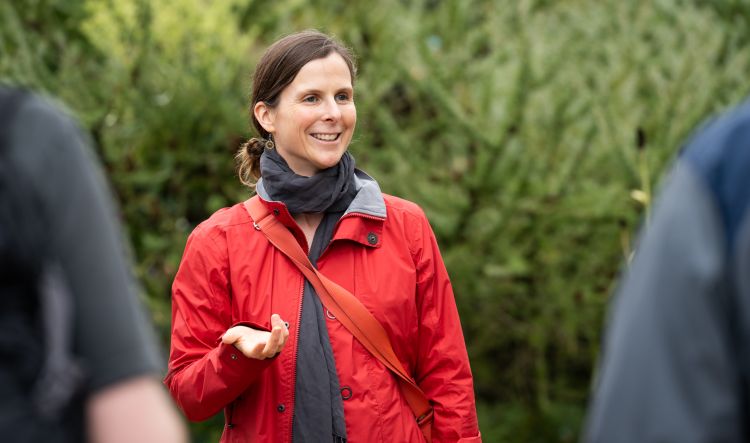Staying well: Dr. Mariah Quinn leads well-being initiatives during COVID-19

When Mariah Quinn, MD, MPH, assistant professor (CHS), General Internal Medicine, assumed the role of director of medicine provider well-being in 2019, burnout, engagement and work-life-balance were issues being examined at systems and work-environment levels.
More recently, as the COVID-19 pandemic disrupted healthcare services and the ways in which we do our work, she has refocused her efforts in ways that were nearly unimaginable 18 months ago. “I see the activities started since COVID began as being a natural evolution of projects I’ve been interested in and working on for a long time,” Dr. Quinn explains. “But the timeframe in which we’re developing, testing, and rolling out is so accelerated. In addition, people are more open than ever before to try things that could help them manage stress and feel better given the emotional arc of the pandemic period.”
Dr. Quinn began her work in physician well-being during her residency at Brigham and Women’s Hospital–Harvard Vanguard Medical Associates in Boston, Massachusetts. There, she completed a research project that tracked mood symptoms in a cohort of residents, finding an estimated period prevalence of depression as high as 60 percent. This startling finding spurred her desire to help doctors take care of their own mental health while serving others. Her initial interest broadened into examining both faculty and learners in academic medical centers, and the unique and shared challenges for each group.
Many roles in the department and the institution
Today, Dr. Quinn describes her current work as a combination of multiple roles. In addition to serving as the department’s Director of Provider Well-being, she also chairs its Climate and Well-being committee, directs the Internal Medicine Residency Program’s Humanism in Medicine curriculum, co-chairs the GME Well-being committee, is a developer and champion of the UW Health COVID-19 Peer Support Program and directs the Department of Medicine Peer Support Program.
“What we’ve been able to achieve in such a short time has been incredible,” she says of the recent program growth during the pandemic. “Everyone is willing. This has clarified what’s important for people and has enabled partners from formerly separate silos to come together and work towards a common solution.”
Through the Climate and Well-being Committee, Dr. Quinn aims to promote a climate where employees and learners feel appreciated, and where wellness and sustained job satisfaction are supported. This has included projects like streamlining email best-practices and bringing bystander intervention trainings to the department. From the end of March through May, Dr. Quinn also developed weekly content for Vital Signs, the Department of Medicine's e-newsletter, to foster connections and share resources during the early weeks of the COVID-19 pandemic.
In her work with the internal medicine residency program and the GME Well-being Committee, Dr. Quinn has helped bring best practices for use across institutional training programs. In the internal medicine residency program, strategies have included regular remote check-ins with Program Director and Vice Chair for Education Bennett Vogelman, MD, remote “hangouts” where residents can have informative conversations and one-on-one check-ins with isolated or quarantined residents.
After helping establish the UW Health COVID-19 Peer Support Program, which has been available since early April, Dr. Quinn translated the concept to the Department of Medicine as a way to bring this method of support to non-clinical staff members. Peer support programs have been found to be effective in many settings, including educational, military, and mental health treatment, and there is great potential for these informal, but confidential, programs here.
'An important time to stay well'
Dr. Quinn’s commitment to well-being and the impact it can have is foundational to building communities. “The meaning of the work we do now extends beyond front-line clinical work…People are feeling empowered to try something new, and UW Health and the Department of Medicine are so invested in making sure our people make it through this okay,” she reflects.
She is also quick to note that “there is no right or wrong way to get into well-being, no matter how overwhelming lists of resources may sometimes seem. Everyone is different, and our needs can vary over time. This is a very important time to try things to feel better or stay well—whether it’s reaching out for support, practicing better sleep hygiene, cementing an exercise routine, or trying mindfulness training.”
Resources:
- “Dr. Mariah Quinn Appointed Director of Medicine Provider Well-being.” Department of Medicine news article. Published December 13, 2018. Accessed May 26, 2020.
- UW Health COVID-19 Peer Support Program and list of DOM faculty participants. Accessed May 26, 2020.
- Department of Medicine Peer Support Program. Accessed May 26, 2020.
- Department of Medicine Employee Well-being Resources. Accessed May 26, 2020.
Banner: Dr. Mariah Quinn leads a 2018 internal medicine residency empathy course. Credit: Clint Thayer/Department of Medicine.